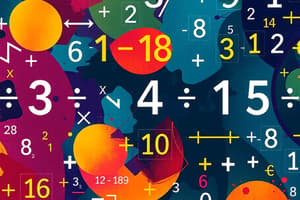Podcast
Questions and Answers
What is the main focus of descriptive statistics?
What is the main focus of descriptive statistics?
- Conducting hypothesis testing
- Understanding chance events
- Making predictions based on sample data
- Summarizing and describing data (correct)
Which of the following is NOT a measure of central tendency?
Which of the following is NOT a measure of central tendency?
- Range (correct)
- Mode
- Median
- Mean
What is a primary topic covered under discrete mathematics?
What is a primary topic covered under discrete mathematics?
- Continuous functions
- Calculus and derivatives
- Statistical inference
- Graph theory (correct)
What utilizes computers to solve complex mathematical problems?
What utilizes computers to solve complex mathematical problems?
Which statistical concept is used to make predictions based on sample data?
Which statistical concept is used to make predictions based on sample data?
Which set of numbers includes all counting numbers?
Which set of numbers includes all counting numbers?
What type of numbers cannot be expressed as a fraction of two integers?
What type of numbers cannot be expressed as a fraction of two integers?
In algebra, what is the primary goal when solving equations?
In algebra, what is the primary goal when solving equations?
Which type of geometry assumes parallel lines in a flat space?
Which type of geometry assumes parallel lines in a flat space?
What does calculus primarily study?
What does calculus primarily study?
What mathematical concept is used to measure the slope of a tangent line?
What mathematical concept is used to measure the slope of a tangent line?
What does statistics primarily focus on?
What does statistics primarily focus on?
In probability, what is being measured?
In probability, what is being measured?
Flashcards
Natural Numbers
Natural Numbers
The set of positive whole numbers used for counting (1, 2, 3, ...)
Integers
Integers
The set of whole numbers and their opposites (..., -3, -2, -1, 0, 1, 2, 3, ...)
Algebraic Expression
Algebraic Expression
A combination of variables, constants, and mathematical operations.
Equation
Equation
Signup and view all the flashcards
Geometry
Geometry
Signup and view all the flashcards
Derivative
Derivative
Signup and view all the flashcards
Integral
Integral
Signup and view all the flashcards
Real Numbers
Real Numbers
Signup and view all the flashcards
Descriptive statistics
Descriptive statistics
Signup and view all the flashcards
Inferential statistics
Inferential statistics
Signup and view all the flashcards
Discrete mathematics
Discrete mathematics
Signup and view all the flashcards
Mathematical modeling
Mathematical modeling
Signup and view all the flashcards
Probability theory
Probability theory
Signup and view all the flashcards
Study Notes
Foundational Concepts
- Mathematics is a formal system of logic and reasoning used for modeling and understanding the world around us.
- It encompasses various branches, each dealing with specific types of objects, structures, and relationships.
- Fundamental concepts underpin the entire subject, including numbers, geometry, algebra, and calculus.
- Sets of axioms and postulates form the basis for mathematical proofs.
Number Systems
- Natural numbers (counting numbers): 1, 2, 3, ...
- Integers: ..., -3, -2, -1, 0, 1, 2, 3, ...
- Rational numbers: Numbers that can be expressed as a fraction p/q, where p and q are integers and q is not zero.
- Irrational numbers: Numbers that cannot be expressed as a fraction of two integers. Examples include pi (π) and the square root of 2 (√2).
- Real numbers: The set of all rational and irrational numbers.
- Complex numbers: Numbers that include the imaginary unit 'i', where i² = -1.
Algebra
- Variables represent unknown quantities.
- Equations represent relationships between variables.
- Inequalities describe relationships where one side is greater than or less than the other.
- Algebraic expressions involve variables, constants, and mathematical operations like addition, subtraction, multiplication, and division; simplification is often necessary.
- Solving equations and inequalities involves manipulating them to isolate the unknown variable.
Geometry
- Geometry deals with shapes, sizes, and positions of objects in space.
- Basic shapes include points, lines, planes, angles, triangles, circles, and polygons.
- Euclidean geometry is a common system that assumes parallel lines and a flat space.
- Non-Euclidean geometries (e.g., hyperbolic, spherical) exist with different postulates about parallel lines.
- Constructions involving compass and straightedge.
Calculus
- Calculus is concerned with rates of change and accumulation of quantities.
- Limit concepts are fundamental to understanding calculus.
- Derivatives measure instantaneous rates of change (slope of a tangent line).
- Integrals compute accumulated quantities (area under a curve).
- Applications include determining velocity, acceleration, area under curves, and volume of solids of revolution.
Statistics and Probability
- Statistics focuses on collecting, analyzing, interpreting, and presenting data.
- Probability deals with measuring the likelihood of events.
- Descriptive statistics summarize and describe data, like measures of central tendency (mean, median, mode) and measures of variation (range, standard deviation).
- Inferential statistics uses data to draw conclusions and make predictions.
- Concepts like sampling, hypothesis testing, and confidence intervals are important.
- Probability theory provides a framework for understanding chance events.
Discrete Mathematics
- Discrete mathematics deals with objects that can be counted (e.g., integers, graphs).
- Topics include logic, sets, counting techniques, graph theory, and algorithms.
- Important principles in discrete mathematics involve combinatorics, recursion, and induction proofs.
- Graphs of vertices and edges model structures in relationships and networks.
Applications of Mathematics
- Mathematics is used in many scientific fields (e.g., physics, engineering, chemistry).
- It has applications in finance, economics, computer science, and other areas.
- Mathematical modeling helps to understand and predict phenomena in diverse fields.
- Computational mathematics utilizes computers to solve complex mathematical problems.
Studying That Suits You
Use AI to generate personalized quizzes and flashcards to suit your learning preferences.




